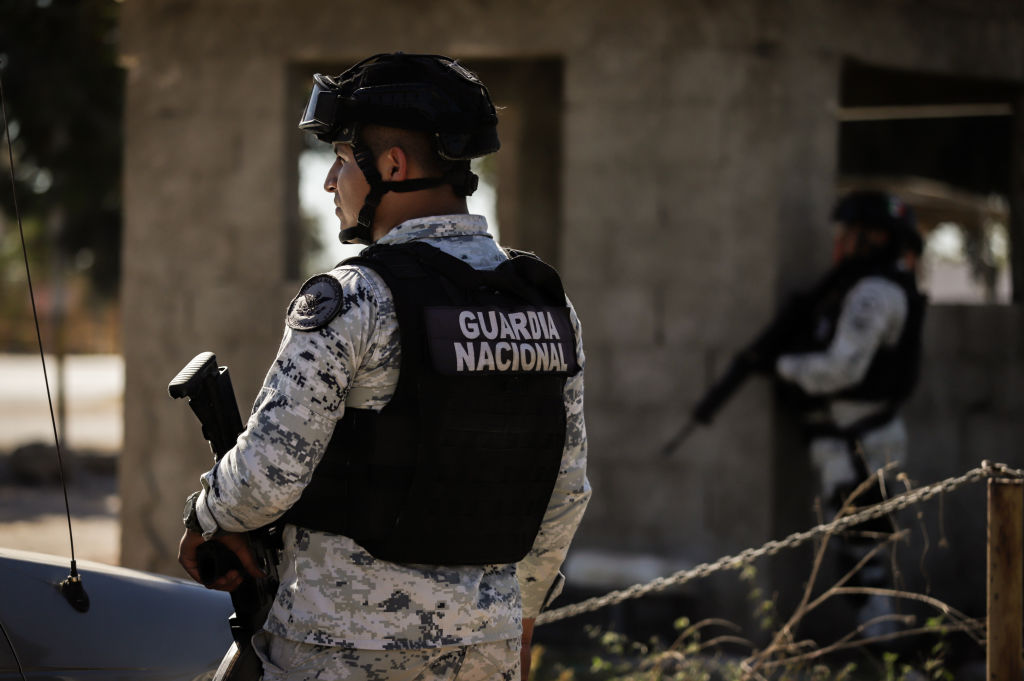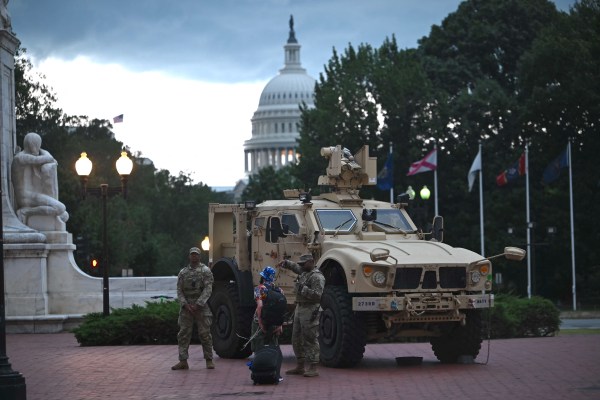Happy Thursday! We’re not sure exactly what’s going on with our neighbors to the north, but a Quebec judge recently ruled Canadians have a “God-given, Charter-enshrined right” to give each other the middle finger.
Have Canadians only been acting polite this whole time because they thought it was illegal to be rude?
Quick Hits: Today’s Top Stories
- A spokesman for Senate Minority Leader Mitch McConnell announced early this morning the Kentucky Republican was hospitalized last night after he “tripped at a local hotel during a private dinner.” The statement indicated McConnell was receiving treatment, but did not disclose the nature of his injuries.
- According to a letter from the National Archives and Records Administration (NARA) to Sens. Chuck Grassley and Ron Johnson, nine boxes of documents were retrieved from the Boston office of President Joe Biden’s attorney Patrick Moore late last year. “When NARA contacted President Biden’s personal counsel on November 3, 2022, to arrange to pick up boxes from the Penn Biden Center in Washington, D.C., they informed NARA that Mr. Moore had moved other boxes from the Penn Biden Center to Mr. Moore’s law firm in Boston,” the letter states. The additional documents were reportedly retrieved on November 9, but the letter—dated earlier this week—says NARA has not reviewed the contents of the boxes for classified material.
- Protesters clashed with police in Tbilisi, Georgia on Wednesday for the second consecutive day, angered by a law proposed by the Georgian government that would require non-governmental and media organizations that receive at least 20 percent of their funding from overseas to register as “foreign agents.” Protesters have compared the law to one in Russia used to crack down on press freedom, and voiced concern its adoption would undercut Georgia’s bid for European Union membership.
- Republican House Speaker Kevin McCarthy on Wednesday rejected an offer from Ukrainian President Volodmyr Zelensky to visit Ukraine, saying he doesn’t “have to go to Ukraine to understand where there’s a blank check or not.” McCarthy added he will “continue to get [his] briefings,” but that he “won’t provide a blank check for anything.” Zelensky had suggested seeing “how we work, what’s happening here, [and] what war caused us,” would “help [McCarthy] with his position” on supporting additional military aid for the war-torn country.
- The Treasury Department announced Wednesday—International Women’s Day—the United States was imposing new sanctions on Iran for its treatment of women and girls. The sanctions singled out two senior officials in the Iranian prison system for their alleged roles in human rights abuses targeting female prisoners in recent months following protests over the death of 22-year-old Mahsa Amini’s death in custody. High-ranking military leaders, three Iranian companies, and other government officials were among those also hit with the latest sanctions, which were imposed in concert with Australia, the United Kingdom, and the European Union.
- The Bureau of Labor Statistics reported Wednesday job openings in the United States fell month-over-month in January to 10.8 million, down from a near-record 11.2 million in December but still well above the historical average. The quits rate—the percentage of workers who quit their job during the month—ticked down to 2.5 percent, while the number of layoffs and discharges edged up slightly to 1.7 million.
- The Bureau of Economic Analysis announced Wednesday the U.S. trade deficit—the gap between the value of U.S. imports and exports—expanded to $68.3 billion in January, up from $67.2 billion in December. Imports were up 3 percent month-over-month while exports grew 3.4 percent, another example of strong economic activity to start the year.
- The Senate voted 81-14 on Wednesday to pass a joint resolution blocking the adoption of a controversial crime bill passed by the D.C. city council which would have reduced maximum sentencing guidelines for some high-profile crimes. President Joe Biden has said he will sign the Senate’s resolution into law.
- In a nearly 90-page report released on Wednesday, the Justice Department—citing hundreds of interviews with officers and hours of body cam footage—found the Louisville Police Department engaged in a pattern of conduct that “deprives people of their rights under the Constitution and federal law.” The years-long investigation—prompted by the fatal shooting of Breonna Taylor in 2020 during a no-knock raid gone wrong—found the department routinely uses excessive force, conducts searches without warning or adequate grounds, and unlawfully discriminates against both black people and people with behavioral health disabilities. The Louisville Metro Government and Louisville Metro Police Department are expected to enter into a court-enforceable consent decree with the DOJ to act on the report’s recommendations.
Moving on Mexico

Late last week, four Americans—Zindell Brown, Shaeed Woodard, Latavia McGee, and Eric James Williams—drove a van from Brownsville, Texas, across the Mexican border, headed to Matamoros as medical tourists. McGee was reportedly scheduled to undergo cosmetic surgery, but she’s lucky to have escaped with her life.
The group of friends were kidnapped by armed men on Friday, and two of them would not cross the border again alive. A third sustained a serious gunshot wound to the leg, and another innocent Mexican citizen was reportedly killed by the gunfire. Mexican authorities have not yet released an official motive for the attack, but the working theory is that members of a drug cartel mistook the group for Haitian drug smugglers. After what was assuredly a harrowing and traumatic weekend, Mexican officials found the group on Tuesday stashed in a wooden house. A man guarding the victims was detained, but no further arrests have been made.
This story, unfortunately, is not all that unique. Matamoros is located in the Mexican state of Tamaulipas—one of seven states in Mexico listed on the State Department’s “Do Not Travel” advisory—and the Cartel del Golfo (Gulf Cartel) is the dominant cartel in the region. Tamaulipas witnessed at least 380 homicides and 18 reported kidnappings last year, according to an official. Incidents of violent crime are a daily occurrence across Mexico. While the total number of homicides in 2022, nearly 31,000, is down 7 percent from 2021, the numbers are still at elevated levels–Mexico has experienced a significant increase in killings since 2016.
And some observers argue crime rates fail to capture the full extent of the problem. A Mexican non-profit organization, Causa en Comun, aggregated reports of violence, killings, and intimidation, finding that these incidents were up 18 percent in the first half of 2022 compared to the same period the year prior. “This work points to an accumulation of stories that present a mosaic of pain and cruelty, hidden behind crime statistics,” the organization said in a statement.
Typically, Americans visiting Mexico rarely face violence, especially when traveling to popular tourist areas. But people seeking medical care often travel to areas along the U.S.-Mexico border, such as Matamoros, where there are higher levels of violent crime.
So what, if anything, can the U.S. do to combat violence in another country? Republican lawmakers argue designating cartels as terrorist organizations is a first step in addressing the alarming trend.
Republican Sens. Roger Marshall and Rick Scott re-introduced the Drug Cartel Terrorist Designation Act yesterday. The bill would formally designate four cartels as foreign terrorist organizations (FTOs), including a faction of the Gulf Cartel. Such labels could give U.S. officials additional pathways to target these factions, analysts say. “If you designate the Sinaloa cartel, for example, that opens a lot of legal tools for the U.S. to go after people either overseas or here inside the United States,” said Javed Ali, a professor at the University of Michigan and former senior director on the National Security Council.
But the White House pushed back against the claim that a terrorist designation would provide additional tools to combat the cartels. “Designating these cartels as FTOs would not grant us any additional authorities that we don’t really have at this time,” press secretary Karine Jean-Pierre said at a briefing, referencing the sanction authorities the U.S. has to combat drug trafficking groups.
State Republican law enforcement officials disagree: 21 Republican State Attorneys General sent a letter to Biden in February calling for cartels to be designated as terror groups, referencing the role the non-state actors play in perpetuating the opioid crisis. “Designating the cartels as FTOs will give state and federal law enforcement agencies increased powers to freeze cartel assets, deny entry to cartel members, and allow prosecutors to pursue tougher punishments against those who provide material support to the cartels,” said the AGs.
Republican legislators in the House have also proposed steps to involve the U.S. armed forces, such as authorizing the use of military force against the cartels. In January, Reps. Dan Crenshaw and Mike Waltz introduced legislation to create the Authorization for Use of Military Force (AUMF) against drug cartels. The authorization would enable the president to use military force to target the fentanyl activities of the cartels.
“It’s time we directly target them,” Crenshaw said. “My legislation will put us at war with the cartels by authorizing the use of military force against the cartels. We cannot allow heavily armed and deadly cartels to destabilize Mexico and import people and drugs into the United States. We must start treating them like ISIS—because that is who they are.”
For the Mexican government, such a step is out of the question. “We will not allow intervention by any foreign country,” said President Andrés Manuel López Obrador. “Mexico is not a colony.” In 2019, former President Donald Trump briefly considered designating the cartels as FTOs following the killing of nine women and children with dual U.S.-Mexican citizenship, but after objections from López Obrador abandoned the idea.
With the rise in crime, López Obrador has faced criticisms for his record on security. The president’s “hugs not bullets” strategy has attempted to address crime through social programs rather than use the military to directly combat the cartels. “[López Obrador] is unwilling to take action that would seriously challenge the cartels,” said Bill Barr, the U.S. attorney general during the Trump Administration, in a Wall Street Journal op-ed last week. “He shields them by consistently invoking Mexico’s sovereignty to block the U.S. from taking effective action.”
What’s Happening to Iranian Schoolgirls?
The alleged poisonings of Iranian school girls began in November at Noor Yazdanshahr Conservatory in the holy city of Qom, 80 miles southwest of Tehran. A few students were hospitalized after falling ill at school, reporting unpleasant smells followed by symptoms like difficulty breathing and nausea. Similar scenes—students wheeled away on gurneys, receiving IV’s and oxygen masks—soon began playing out at schools across the country.
No deaths have been confirmed and most students have recovered, but the incidents have exploded in frequency in recent days, with thousands of students—mostly young women—reportedly affected in dozens of cities. With limited information and little trust in the regime’s response, Iranians have begun protesting and demanding investigations.
So far, no conclusive evidence has emerged to explain exactly what’s going on—which analysts say reflects the difficulty of systematically capturing samples and interviewing affected people. “You’ve got to talk to people who have been affected and witnesses to those who were affected,” said Alastair Hay, a toxicologist who has researched chemical attacks and helped draft the World Health Organization’s handbook on responding to biological and chemical weapons. “Take blood, urine, and saliva samples and have them comprehensively analyzed.”
But the myriad substances which could be at fault in these incidents often dissipate quickly, Hay told The Dispatch, making it difficult to collect them. Iran’s interior ministry said Monday a few of the students had been exposed to “inhaled irritants” which caused symptoms, but officials haven’t released details of the testing and say most students showed no signs of toxic substance exposure.
Officials’ explanations have also varied widely since the incidents began, from carbon monoxide poisoning caused by schools’ natural gas heating to rumor-fueled hysteria, activists fomenting unrest, or extremists punishing young women for attending school. “After several poisonings of students in Qom schools, it was found that some people wanted all schools, especially girls’ schools, to be closed,” said Younes Panahi, a deputy health minister, according to state-run IRNA news.
Without conclusive evidence of deliberate attacks, other analysts have suggested social contagion—rather than broad coordinated or copycat attacks—may be playing a role in the incidents’ wildfire spread.
Many symptoms students have experienced, such as headaches and faintness, may be attributable to various chemical attacks but could also be brought on by stress and hyperventilation. And after the first incident and recent press coverage, students are likely on high alert. “There’s all kinds of smells around, and ordinarily they don’t pay much attention to it,” said Robert Bartholomew, a sociologist who has investigated such outbreaks. “But now they’re hyper vigilant for any unusual or unfamiliar or strange odor in the environment, which is easily redefined as some type of chemical attack.” And, Bartholomew said, young women in restrictive, stressful environments—which describes most of the students so far affected—are particularly likely to experience what’s called mass psychogenic illness. The World Health Organization investigated a spate of reported schoolgirl poisonings in Afghanistan from 2009 to 2012 and concluded this is likely what happened.
But rigorous investigation to either find perpetrators or disprove reported attacks will require officials to cooperate with communities and earn trust—a tall order in Iran, where the regime has recently arrested thousands of protesters and killed hundreds more to quash dissent. Some Iranians have speculated the seeming poisonings are regime-backed attacks intended to punish female students, who have been at the forefront of protests over the death in custody of a young woman detained for alleged violations of Iran’s religious dress code. Videos show hundreds of people protesting in Tehran and a handful of other cities in recent days, some chanting, “Death to the child-killing regime.” University students lay on the ground holding protest signs, and videos show security forces tear gassing and arresting protesters.
Perhaps in response to the growing outrage, the regime has pivoted toward taking the incidents seriously: Last week, Iranian President Ebrahim Raisi assigned officials to investigate, and Supreme Leader Ayatollah Ali Khamenei said this week such poisonings would be “a great and unforgivable crime,” punishable by death. Shortly thereafter, Deputy Interior Minister Majid Mirahmadi told state television that officials had arrested people in five provinces, though he didn’t say who or offer evidence connecting them with the alleged poisonings. Security forces have also detained journalists who have been covering the incidents.
It’s unclear whether these measures will stop the incidents or satisfy concerned Iranians. “The crucial thing is for people to have confidence in the investigation,” said Hay. “It’s probably going to be difficult in Iran.”
Worth Your Time
- A lot has been written recently about the negative effects of social media on young people, especially young girls. But wait, there’s more: “TikTok launched a beguiling new filter last week that promises to turn every user into the most flawless version of themselves,” Caroline Downey reports for National Review. “While some social-media influencers reveled in their goddess-like transformations, many users recoiled at the dramatic disparity between their real and artificial appearances. The disturbed reactions are a harbinger of what’s to come, according to several developmental psychologists who predict that the artificial-intelligence-driven technology will be catastrophic for the mental and physical wellbeing of young girls, who already harshly judge themselves against unattainable aesthetic standards. While many early social-media effects were comical or obviously contrived … the new TikTok filter removes all facial imperfections without the glitches and other clues that previously revealed the unreality of filtered images. The filter is likely to raise the already sky-high bar for beauty, and young girls will be hardest hit, according to Dr. Silja Kosola, a professor in adolescent medicine at the Pediatric Research Center at the University of Helsinki in Finland.”
- In a story for the Atlantic, Matthew Kirschenbaum imagines a world the TMD team happens to find quite disconcerting, where artificial intelligence renders human writers—at least on the internet—almost obsolete. “We may quickly find ourselves facing a textpocalypse, where machine-written language becomes the norm and human-written prose the exception,” he writes. “It is easy now to imagine a setup wherein machines could prompt other machines to put out text ad infinitum, flooding the internet with synthetic text devoid of human agency or intent: gray goo, but for the written word. The ‘Properties’ window for the document in which I am working lists a total of 941 minutes of editing and some 60 revisions. That’s more than 15 hours. Am I worried that ChatGPT could have done that work better? No. But I am worried it may not matter. Swept up as training data for the next generation of generative AI, my words here won’t be able to help themselves: They, too, will be fossil fuel for the coming textpocalypse.”
Presented Without Comment
Also Presented Without Comment
Also Also Presented Without Comment
Toeing the Company Line
- In the newsletters: The Dispatch Politics team reports on the likelihood of a Glenn Youngkin candidacy and checks in on Govs. Ron DeSantis and Larry Hogan, Scott dives deep (🔒) on CHIPS Act subsidies, and Nick takes on Tucker Carlson’s January 6 revisionism. “Carlson isn’t sketching out a narrative of the insurrection, he’s offering viewers different paths to reach the conclusion that whatever happened that day shouldn’t be held against Trump, the Republican Party, or the broader right,” he argues.
- On the podcasts: Old friend David French is back on The Remnant for a wide-ranging conversation about everything from Fox News to drag queens. Somehow, David was also at the University of Kentucky with Sarah for a live taping of Advisory Opinions, covering corporate hiring and investment, what Gruyere cheese has to do with the law, and David’s darkest secret.
- On the site: Harvest reports on the United States’ child labor problem, and Gary Schmitt asks what it would take, constitutionally and legally speaking, to involve American troops in a conflict between China and Taiwan.
Let Us Know
Should the United States designate Mexican drug cartels as foreign terrorist organizations?









Please note that we at The Dispatch hold ourselves, our work, and our commenters to a higher standard than other places on the internet. We welcome comments that foster genuine debate or discussion—including comments critical of us or our work—but responses that include ad hominem attacks on fellow Dispatch members or are intended to stoke fear and anger may be moderated.
With your membership, you only have the ability to comment on The Morning Dispatch articles. Consider upgrading to join the conversation everywhere.